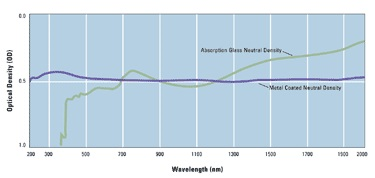Omega Optical’s neutral density (ND) filters can uniformly attenuate the intensity of light across a broad spectral range.
Attenuation, or optical density (OD), is realized in two ways: by a blend of absorption and reflection using a thin-film metal coating, or by absorption using a light-absorbing glass.
ND filters can attenuate spectral regions selected from 250 to 2500 nm. OD can be defined as −log10 (T) and can take values between 0.04 and 4. Overall attenuation is additive; thus, ND filters can be placed on top of each other to obtain the necessary OD level.
Filter Types
Absorption Glass Neutral Density
Uncoated, gray-tinted glass attenuates fully through absorption. The degree of attenuation depends on the width of the glass. In general, the absorption glass ND filters are effective only in the visible region of the spectrum. They are not transmissive in the UV region. The surface of the filters can be made anti-reflective to provide the needed OD with absorbance, in addition to very low reflectance.
Metallic-Coated Neutral Density
Metallic-coated ND filters carry out attenuation by a blend of absorption and reflection. Thus, this type of ND filter is comparatively more uniform and neutral than the absorption glass ND filter. Metallic-coated ND filters can be created for a wider spectral range (Figure 1 provides a comparison).

Figure 1. Neutral density comparison.
The above figure illustrates a comparison of a metallic-coated ND filter with an absorption glass ND filter.